EUROSAC Grand Prix
The industry’s latest and most promising innovations are presented each year at the EUROSAC Grand Prix Award ceremony during the annual congress. The Grand Prix demonstrates the versatility and efficiency of our solutions for the packaging industry – in all fields of application.
Grand Prix 2025
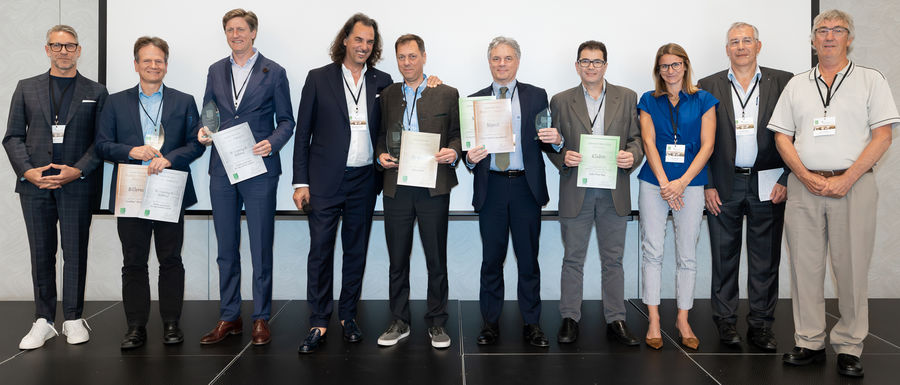
The Grand Prix honoured outstanding innovation in performance, sustainability, and customer value in during the congress in Thessaloniki. “It’s a showcase of what modern paper sack technology can achieve – and how our industry envisions the paper sacks of tomorrow,” said EUROSAC President Alessandro Selmin. “What looks like a simple paper sack often hides cutting-edge technology.” Praising the high quality of the submissions submitted by the participants, jury president Herbert Rode noted that “the winning solutions clearly stood out.”



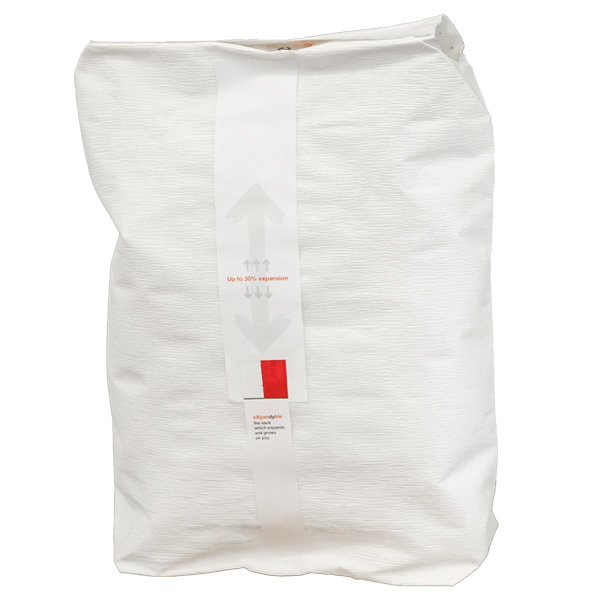 The Gold Award went to eXpandyblefrom dy-pack. The Gold Award went to eXpandyble from dy-pack. The sack offers a smart and flexible solution: it expands precisely to the required volume during filling – by up to 30%. Whether the adjustment needed is 5% or 25%, the sack adapts automatically and ensures optimal filling accuracy. One sack size can be used for various products reducing stock and simplifying logistics. An additional benefit: lower internal pressure during filling enables a noticeably faster filling process. The sack is considerably stronger than conventional sacks, reducing breakage. The sack’s surface supports water uptake during the recycling process, aligning with established recycling practices. “It solves a common customer problem and can help replace non-paper solutions where variable sizes are needed,” the jury noted.
The Gold Award went to eXpandyblefrom dy-pack. The Gold Award went to eXpandyble from dy-pack. The sack offers a smart and flexible solution: it expands precisely to the required volume during filling – by up to 30%. Whether the adjustment needed is 5% or 25%, the sack adapts automatically and ensures optimal filling accuracy. One sack size can be used for various products reducing stock and simplifying logistics. An additional benefit: lower internal pressure during filling enables a noticeably faster filling process. The sack is considerably stronger than conventional sacks, reducing breakage. The sack’s surface supports water uptake during the recycling process, aligning with established recycling practices. “It solves a common customer problem and can help replace non-paper solutions where variable sizes are needed,” the jury noted.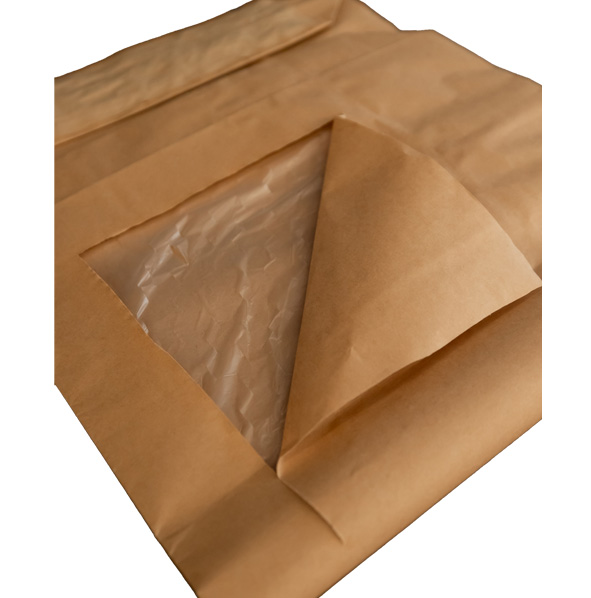 The companies W. Gröning & Billerud were presented with the Silver Award for their joint project Future-Proof Paper Sack for Low-Carbon Cement. The solution combines ultra-breathable and semi-extensible sack kraft paper with an 8 µm HDPE film containing 35% PCR to meet future PPWR regulations. It ensures dust-free, high-efficiency filling of finer, low-carbon cement blends which are expected to become increasingly common. At the same time, the sack offers strong moisture protection, high strength and a reduced carbon footprint, using materials already available on the market. The jury highlighted the dual innovation: an improved paper porosity for finer cement blends and a recycled PE film performing in line with conventional options.
The companies W. Gröning & Billerud were presented with the Silver Award for their joint project Future-Proof Paper Sack for Low-Carbon Cement. The solution combines ultra-breathable and semi-extensible sack kraft paper with an 8 µm HDPE film containing 35% PCR to meet future PPWR regulations. It ensures dust-free, high-efficiency filling of finer, low-carbon cement blends which are expected to become increasingly common. At the same time, the sack offers strong moisture protection, high strength and a reduced carbon footprint, using materials already available on the market. The jury highlighted the dual innovation: an improved paper porosity for finer cement blends and a recycled PE film performing in line with conventional options.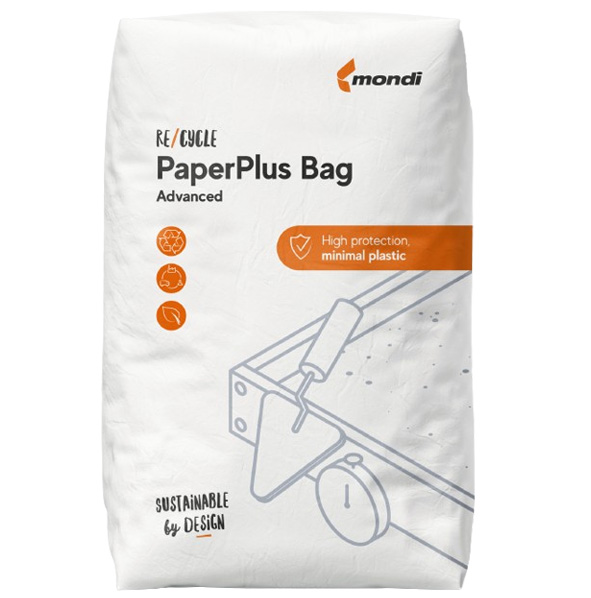 The Bronze Award was given to re/cycle PaperPlus Bag Advanced by Mondi. This high-performance paper sack features an advanced 20 µm barrier film that replaces standard 30–50 µm HDPE layers. It reduces plastic consumption by up to 60% while maintaining the same moisture protection. Customers benefit from reduced emissions, improved recyclability and compatibility with existing filling equipment, all while enhancing compliance with evolving EU regulations and preserving product performance. The jury praised the impressive film reduction and the product’s focus on recyclability and performance.
The Bronze Award was given to re/cycle PaperPlus Bag Advanced by Mondi. This high-performance paper sack features an advanced 20 µm barrier film that replaces standard 30–50 µm HDPE layers. It reduces plastic consumption by up to 60% while maintaining the same moisture protection. Customers benefit from reduced emissions, improved recyclability and compatibility with existing filling equipment, all while enhancing compliance with evolving EU regulations and preserving product performance. The jury praised the impressive film reduction and the product’s focus on recyclability and performance.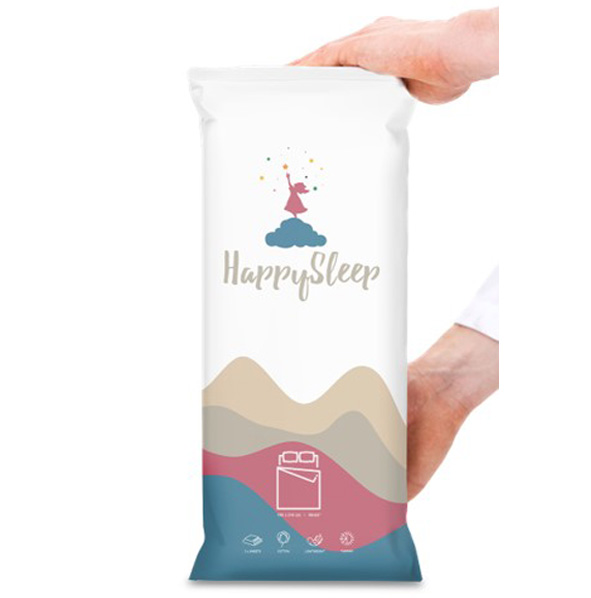 ConFlex® HeatSeal developed by Billerud impressed the audience and was honoured with the Public Choice Award. It is a recyclable, PE-free heat-sealable paper that replaces plastic wraps in pre-made bag and form-fill-seal applications. The clay-based coating ensures recyclability, making it a future-proof alternative. Used by a Swedish furniture brand, it cut plastic waste while reducing CO₂ emissions by estimated 50%, increasing line speed by 30% and boosting packing efficiency by 20%. With a CEPI recyclability score of 18/20 and food contact approval, the solution offers environmental and operational advantages.
ConFlex® HeatSeal developed by Billerud impressed the audience and was honoured with the Public Choice Award. It is a recyclable, PE-free heat-sealable paper that replaces plastic wraps in pre-made bag and form-fill-seal applications. The clay-based coating ensures recyclability, making it a future-proof alternative. Used by a Swedish furniture brand, it cut plastic waste while reducing CO₂ emissions by estimated 50%, increasing line speed by 30% and boosting packing efficiency by 20%. With a CEPI recyclability score of 18/20 and food contact approval, the solution offers environmental and operational advantages.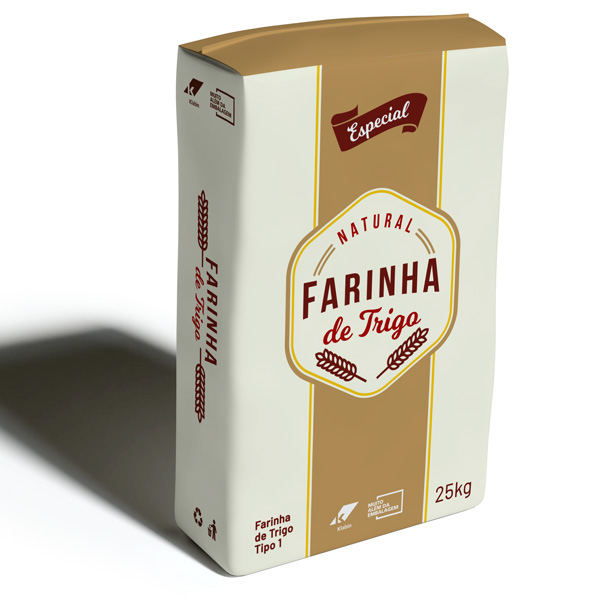 EUKA FLOUR BAG by Klabin is a plastic-free multiwall valve sack made 100% from short-fibre Eucalyptus paper. It features an innovative easy-open ribbon made solely from paper and a sealable valve using special resins instead of film. Designed for 25 kg wheat flour, the sack combines strong product protection, high print quality, excellent runnability, perfect logistics performance and improved resource efficiency.
EUKA FLOUR BAG by Klabin is a plastic-free multiwall valve sack made 100% from short-fibre Eucalyptus paper. It features an innovative easy-open ribbon made solely from paper and a sealable valve using special resins instead of film. Designed for 25 kg wheat flour, the sack combines strong product protection, high print quality, excellent runnability, perfect logistics performance and improved resource efficiency.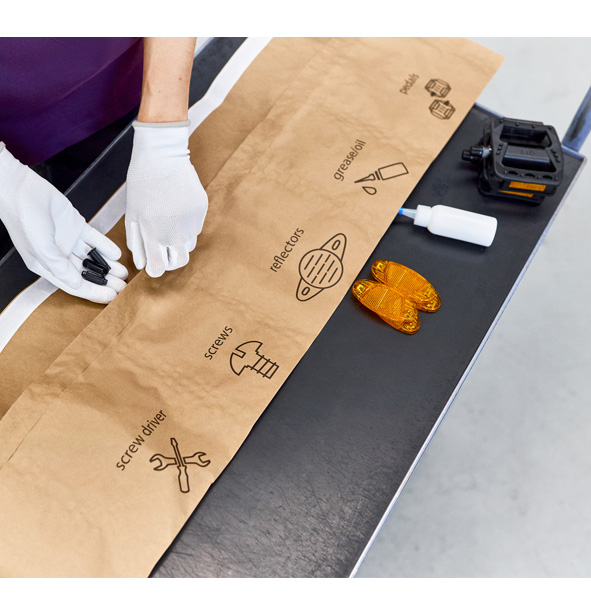 Mondi presented as a second entry re/cycle ProtectorBAG PocketForm, a fully paper-based flexible packaging solution that replaces plastic in transport and storage. With up to seven customisable compartments and individual printing, it offers organised, branded and damage-minimising protection for diverse items – a versatility that opens opportunities across various industries. Its compact form and easy handling support logistics efficiency. Made from renewable, responsibly sourced paper, the packaging is recyclable and helps reduce plastic waste.
Mondi presented as a second entry re/cycle ProtectorBAG PocketForm, a fully paper-based flexible packaging solution that replaces plastic in transport and storage. With up to seven customisable compartments and individual printing, it offers organised, branded and damage-minimising protection for diverse items – a versatility that opens opportunities across various industries. Its compact form and easy handling support logistics efficiency. Made from renewable, responsibly sourced paper, the packaging is recyclable and helps reduce plastic waste.